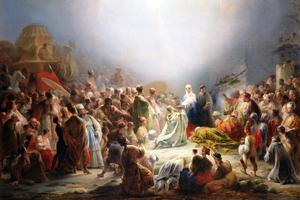Do You Want to Be Healed?
Our Lord has the power to heal you and set you free — if you let him.

The Gospel of John is traditionally broken into two parts — chapters 1–11 are called the Book of Signs, while chapters 12–21 are called the Book of Glory.
I particularly love praying with the Book of Signs. In John’s Gospel, there is a particular word for what in the other Gospels are called miracles. In John, we call them “signs.” For the sake of simplicity, I’ll suffice it to say that each sign, each of the acts that Jesus performs in this first part of John’s Gospel, gets bigger and bigger — each one pointing to the reality that is right in front of the people of Jesus’ day — namely, that this man is the Messiah.
From the Wedding Feast at Cana, to the various healings performed by the Lord, to the crucial moment in the Bread of Life discourse where Jesus sets forth a radical truth and loses so many of his followers, to where all these signs culminate — in the raising of Lazarus. It is in this chapter that we see the Lord Jesus at his most human, in weeping deeply for his friend, Lazarus, and at his most divine (until, of course, we read of his own resurrection), in raising Lazarus, who was four days dead, to life.
The healing of the man by the pool at Bethesda who had been ill for 38 years, which can be found in the Book of Signs (John 5:1-16) has many different ways in which we can explore this Gospel in lectio and in study. We can, of course, go down the “letter of the law, the spirit of the law” route, warning us to be pastoral and not be “rigid,” which seems to be the parole du jour (along with clericalism) in our Catholic press lately. This is not the route I wish to explore.
Likewise, I do not wish to explore the role of the healings in the explication and exemplification of the inbreaking of the Kingdom of God who is the Person of Christ Himself. This should be readily apparent to all students of theology since the Second Vatican Council urged us to look out for the gestis verbisque, the deeds and words of the Lord, in the Constitution on Divine Revelation, Dei Verbum.
Nor will I explore the role of the “Jews,” which we must admit in John’s Gospel holds a curious place, representing not necessarily the Jewish people in their entirety, but all the forces of the world in opposition to the Messiah. (You see what I did there — by stating what I’m not mentioning, I went and mentioned all of the usual tropes).
No, what I wish to address today is the one line that Our Lord asks the man by Bethesda: “Do you want to be well?” It seems so simple, doesn’t it, so very obvious. The man has been ill for 38 years, so, naturally we would assume that he wants to be well, right?
But, human nature being what it is, maybe this man doesn’t want to be well. Perhaps he’s grown used to being ill, like the person with a toothache who, after making the appointment with the dentist, notices that he or she no longer feels “that bad” or the person on the way to the barber who, after making the appointment for a haircut, looks in the mirror and thinks that he might be able to put it off for a few more weeks.
We grow use to our fallen condition, even if it is not ideal, primarily because we fear change. We fear the unknown, which, if I am honest with myself, is the biggest challenge of these COVID-19 days.
We grow used to living in our fallen, broken condition, living in our sins — certainly not rejoicing in it, but living, nonetheless in a situation that Jesus wishes to take us out of and that he has the power to do. We choose to crawl, when indeed we can fly.
But the Lord Jesus respects us and respects our freedom. He does not want to force us, but to offer us healing and strength. The Lord Jesus says to us as he said to the man at Bethesda: “Do you want to be well?” He wants to heal us and set us free. He has that power as he is God Incarnate. “Do you want to be well?” So, what do you say?
- Keywords:
- grace
- healing
- Jesus christ

















